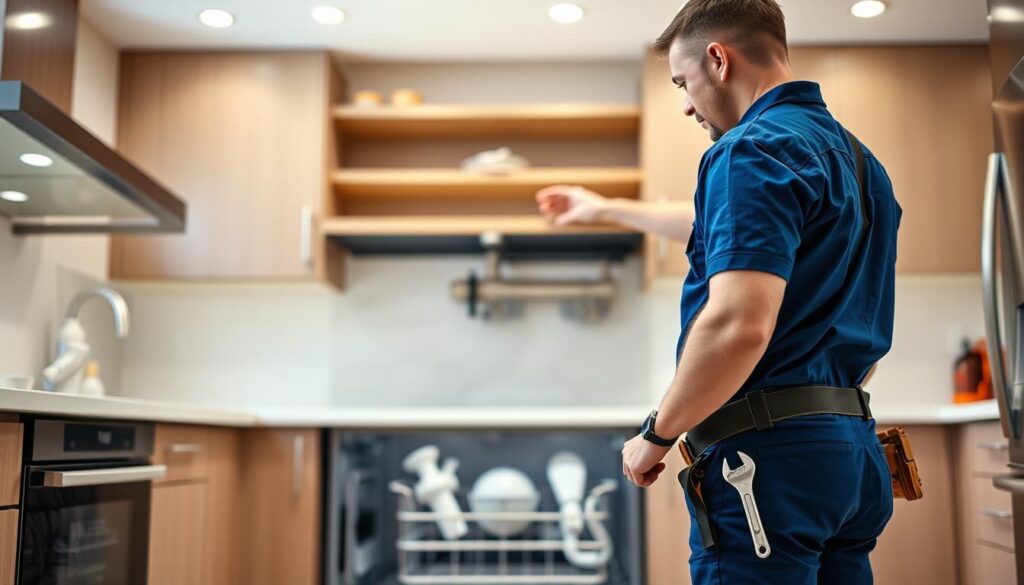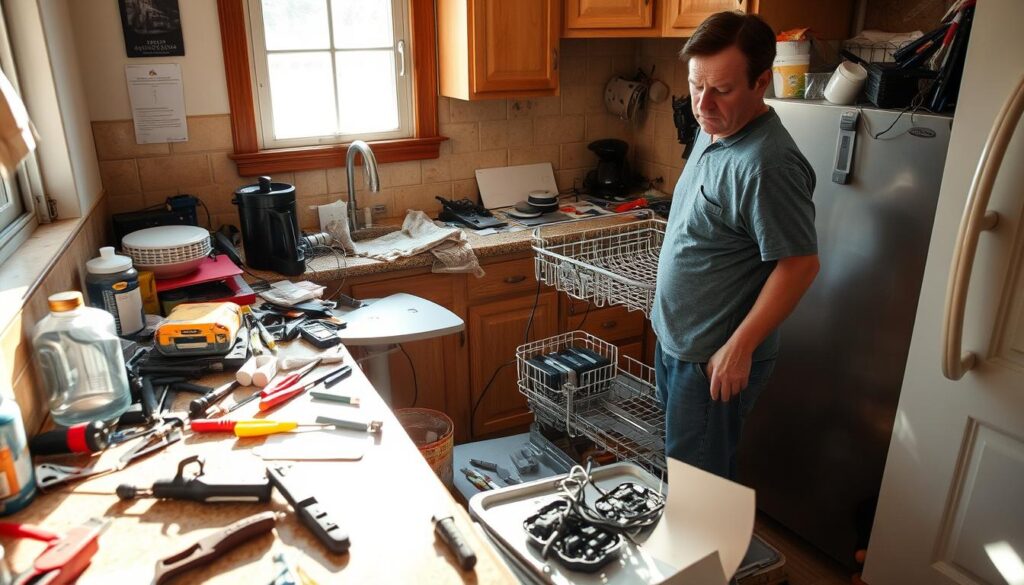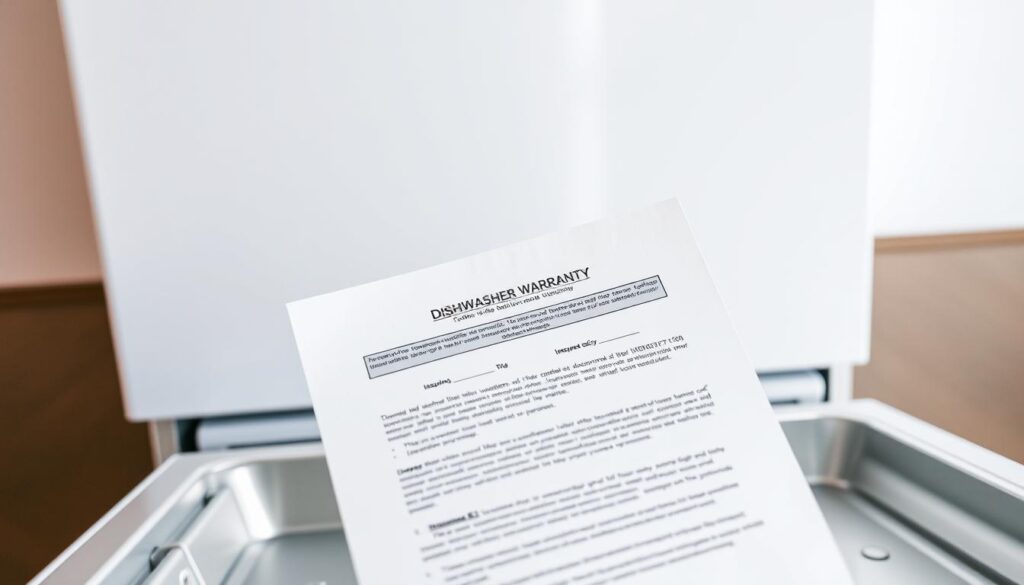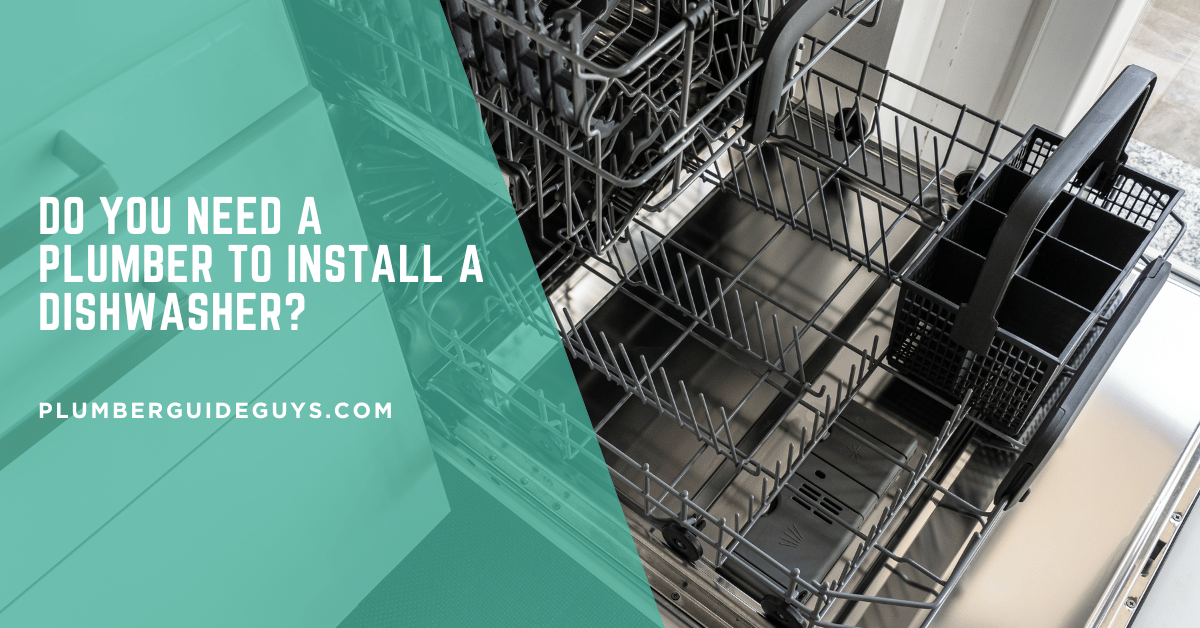Affiliate Disclosure
Plumber Guide Guys is a participant in the Amazon Services LLC Associates Program, an affiliate advertising program designed to provide a means for sites to earn advertising fees by advertising and linking to Amazon.
Do You Need a Plumber to Install a Dishwasher? Are you wondering if you need a plumber for your new dishwasher? Installing a dishwasher is more than just plugging it in. It involves complex tasks that might surprise you.

Installing a dishwasher requires more than just basic skills. You need to handle water connections, electrical work, and follow local codes. A professional plumber can protect your home from water damage and electrical risks.
Experts make sure your dishwasher is installed right. They check for any issues before they become big problems. This saves you time and money.
Key Takeaways
- Professional plumbers provide expert dishwasher installation
- Proper installation prevents water damage and electrical hazards
- Plumbers understand complex building code requirements
- Professional service can save money long-term
- Warranty protection often depends on professional installation
Table of Contents
Understanding Dishwasher Installation Requirements
Installing a dishwasher is more than just plugging it in. It needs careful planning and technical skills for safe and efficient use.
Before installing a dishwasher, you must know several key things. These are important for a successful setup.
Basic Plumbing Connections Needed
To connect your dishwasher to water, you need to follow specific steps. You’ll need:
- Hot water supply line
- Drain line connection
- Electrical outlet nearby
- Appropriate water pressure
Required Tools and Materials
For successful plumbing, you’ll need certain tools:
- Adjustable wrench
- Pipe tape
- Screwdrivers
- Level
- Flexible water supply line
Local Building Codes and Permits
Every area has its own rules for appliance installations. Some places need a professional to connect your dishwasher.
Always check local building codes before starting your installation project.
| Requirement | Details |
|---|---|
| Water Pressure | 40-120 PSI recommended |
| Electrical | 120V dedicated circuit |
| Drain Line | High loop or air gap required |
Getting professional help can make sure you meet all the installation needs. It can also avoid expensive mistakes.
Do You Need a Plumber to Install a Dishwasher?
Thinking about whether you need a plumber for your dishwasher? It’s not just about water lines. It’s about making sure it’s safe, works well, and follows the rules.
There are times when you really need a plumber for your dishwasher:
- Complex kitchen layouts with non-standard plumbing
- Older homes with outdated water connections
- Lack of existing electrical or water infrastructure
- Potential structural modifications required
Installing a dishwasher yourself might save money. But, it could also lead to big problems. These include:
- Water damage to kitchen floors
- Electrical hazards
- Voided manufacturer warranties
- Potential code violation penalties
| Installation Scenario | Recommended Action |
|---|---|
| New Kitchen Construction | Professional Installation Recommended |
| Replacing Existing Dishwasher | DIY Possible with Proper Knowledge |
| Complicated Plumbing Setup | Professional Plumbing Required |
Professional plumbers do more than just connect things. They know the local rules, spot problems, and make sure your dishwasher works right.
Safety Considerations for Dishwasher Installation
Installing a dishwasher is a job that needs careful handling. It involves electricity and water, making safety very important. DIY dishwasher hookup requires attention to many hazards that could harm your home and you.
Electrical Safety Precautions
Electrical risks are big when working on water line installation for dishwashers. To stay safe, follow these key guidelines:
- Always disconnect power at the circuit breaker before starting installation
- Use a voltage tester to confirm electrical circuits are inactive
- Wear insulated rubber-soled shoes
- Use properly grounded electrical outlets
Water Damage Prevention
Bad water line connections can cause a lot of damage. To avoid leaks, do the following:
- Check all connection points for tight seals
- Use high-quality braided stainless steel supply lines
- Apply plumber’s tape on threaded connections
- Do a thorough leak test after installation
Proper Ventilation Requirements
Good ventilation is key to avoid moisture problems during and after installation. Make sure there’s enough air flow to prevent:
| Potential Risk | Prevention Strategy |
|---|---|
| Mold Growth | Maintain gap between dishwasher and surrounding cabinetry |
| Condensation Buildup | Install with recommended clearance around appliance |
| Humidity Accumulation | Use moisture-resistant materials in installation area |
Professional tip: If you’re unsure about any step, get a licensed plumber. They can ensure safety and follow local building codes.
Professional Plumbing Services vs. DIY Installation
Deciding between hiring a plumber and doing it yourself for dishwasher installation is tough. Your choice affects the installation, the appliance’s future performance, and your home’s safety.
Professional plumbers have skills that DIY efforts might miss. They ensure the right connections, alignment, and follow local building codes.
- Expertise in complex water line connections
- Guaranteed proper electrical and drainage setup
- Immediate problem resolution during installation
- Warranty protection for installation work
DIY dishwasher installation might look cheaper at first. But, it can lead to water damage, electrical dangers, or voiding the warranty.
| Professional Installation | DIY Installation |
|---|---|
| Certified technician | Personal skill level |
| Guaranteed workmanship | Potential for errors |
| Code compliance | Possible code violations |
| Warranty protection | Risk of voiding warranty |
Your specific circumstances will decide the best choice. Think about your technical skills, available time, and comfort with plumbing and electrical work.
Step-by-Step Process of Dishwasher Installation
Installing a dishwasher might seem tough, but with the right help, you can do it. This guide will show you how to install a dishwasher easily and successfully.
First, get all the tools you need and set up your workspace. Good preparation is essential for a successful installation.
Removing the Old Dishwasher
Here’s what to do first:
- Turn off power at the circuit breaker
- Disconnect electrical connections
- Shut off the water supply valve
- Disconnect water and drain lines
- Remove mounting screws securing the old unit
Preparing the Installation Space
Next, measure and clean the area. Make sure it’s level and clean. Check the floor for damage or uneven spots that could affect the dishwasher’s placement.
Connecting Water Lines and Drainage
Here’s how to connect the dishwasher to water:
- Check the water supply line for damage
- Use proper compression fittings
- Ensure connections are tight but not too tight
- Look for leaks before finishing the installation
Pro Tip: Always use new supply lines and follow the manufacturer’s instructions for your dishwasher model.
If you’re unsure about any part of the installation, it’s okay to ask for help from a professional.
Common Installation Challenges and Solutions

Installing a dishwasher isn’t always easy. Your home setup can surprise you with unexpected problems. Knowing these challenges helps you get ready for a smooth install.
Kitchen layouts often cause unique problems during installation. Older homes might have odd cabinet spaces or outdated plumbing. These can make the process harder.
- Space Constraints: Measure your kitchen’s dimensions carefully before purchasing
- Plumbing Compatibility: Check existing water line connections
- Electrical Requirements: Ensure proper voltage and outlet positioning
- Cabinet Modifications: Some installations require minor carpentry work
Some big challenges you might face include:
| Challenge | Potential Solution |
|---|---|
| Uneven Floor | Use adjustable mounting brackets |
| Tight Cabinet Space | Consider compact or slim-line models |
| Outdated Plumbing | Professional retrofitting of water lines |
Pro tip: When in doubt, consulting a professional plumber can save you time and avoid costly mistakes during your home dishwasher setup.
Cost Analysis: Professional Installation vs. DIY
Thinking about dishwasher installation can be tricky. It’s important to know the costs involved. This helps you decide between hiring a pro or doing it yourself.
At first, DIY might seem cheaper. But, there are hidden costs to consider.
Labor Costs and Time Investment
Professionals charge $100-$300 for the job. This might seem steep. But DIY comes with its own costs:
- Time spent (3-5 hours for beginners)
- Lost wages from work
- Time to learn and research
Additional Materials and Tools
DIY needs special tools and parts:
- Adjustable wrench: $15-$30
- Plumber’s tape: $3-$5
- Electrical cable: $20-$50
- Drain line: $10-$25
Potential Repair Costs from DIY Mistakes
DIY mistakes can cost a lot. Water damage, electrical problems, or wrong connections might lead to:
- Flood damage repairs: $500-$3,000
- Voiding the appliance warranty
- Electrical system repairs
Professionals guarantee their work. This lowers the risk of future costs.
Warranty Considerations and Insurance Requirements

Setting up your home dishwasher is more than just plugging it in. Knowing about warranties and insurance can save you a lot of money and trouble later.
Most manufacturers have rules for who can install their appliances. They usually need a pro to install to keep the warranty good. Trying to do it yourself might make your warranty invalid.
- Professional installation ensures warranty protection
- Improper setup can lead to insurance coverage complications
- Certified technicians understand specific manufacturer requirements
Insurance companies also check how appliances are installed. If a dishwasher is installed wrong and causes water damage, your insurance might not cover it. This could leave you paying for repairs and new appliances yourself.
| Installation Type | Warranty Impact | Insurance Risk |
|---|---|---|
| Professional Installation | Full Warranty Coverage | Low Risk |
| DIY Installation | Potential Warranty Void | High Risk |
Always check your warranty and insurance policy for your home dishwasher setup.
Essential Maintenance After Installation
After setting up your dishwasher at home, keeping it in good shape is key. Experts say a regular care plan is essential. This way, your dishwasher can last up to 10 years.
Keeping your dishwasher’s plumbing connections in check is important. Here’s what you need to do:
- Clean filters monthly to prevent debris buildup
- Inspect water supply lines for any leaks
- Run a cleaning cycle with dishwasher cleaner every three months
Make sure to check important parts of your dishwasher. Professional plumbers suggest looking at hoses for wear or issues. Also, check the door seal and make sure spray arms are clear.
Here are some maintenance tips to remember:
- Scrape dishes before loading to avoid food buildup
- Use the right detergent for your water type
- Regularly clean the drain area
Pro tip: Getting a professional to check your dishwasher once a year can prevent costly repairs.
Signs You Should Definitely Call a Professional
Knowing when to call a professional for dishwasher installation can prevent big problems. Some signs show it’s time to get a plumber instead of trying to do it yourself.
Figuring out if you need a plumber for dishwasher installation means spotting tricky situations. Look out for these red flags that mean you should get help:
- Complicated Plumbing Configurations: Older homes with non-standard kitchen layouts or unique plumbing connections
- Electrical wiring that seems complex or requires significant modifications
- Significant water line or drainage system modifications
- Visible signs of water damage or possible pipe incompatibility
Here are specific situations that need a pro:
- Persistent water leaks around the dishwasher area
- Unusual electrical connections or outdated circuit needs
- Potential structural changes needed for proper installation
- Lack of required permits or compliance with local building codes
Professional plumbers are experts in handling tricky installations. They ensure the right connections, avoid water damage, and make sure your dishwasher works well and safely.
Remember, investing in professional plumbing services can save you from costly future repairs and possible home damage.
While DIY installation might seem cheaper, the risks are often too high. Professional plumbers offer peace of mind with their expert installation and long-term reliability.
Conclusion
Deciding if you need a plumber to install a dishwasher depends on your skills and comfort level. Professional plumbing for appliances saves time, money, and avoids headaches. It’s a smart choice for many homeowners.
Most people choose to hire a professional for a safe and correct installation. DIY fans might think they can do it, but the risks are high. Issues like water damage, electrical problems, and voided warranties are serious.
Your home’s plumbing, local codes, and the installation’s complexity matter. If you’re unsure, a professional plumber can offer peace of mind. They ensure your dishwasher is installed right, protecting your investment.
A well-installed dishwasher works well and avoids expensive repairs later. Whether you hire a pro or do it yourself, focus on safety and precision. Follow the manufacturer’s guidelines for the best results with your new appliance.

